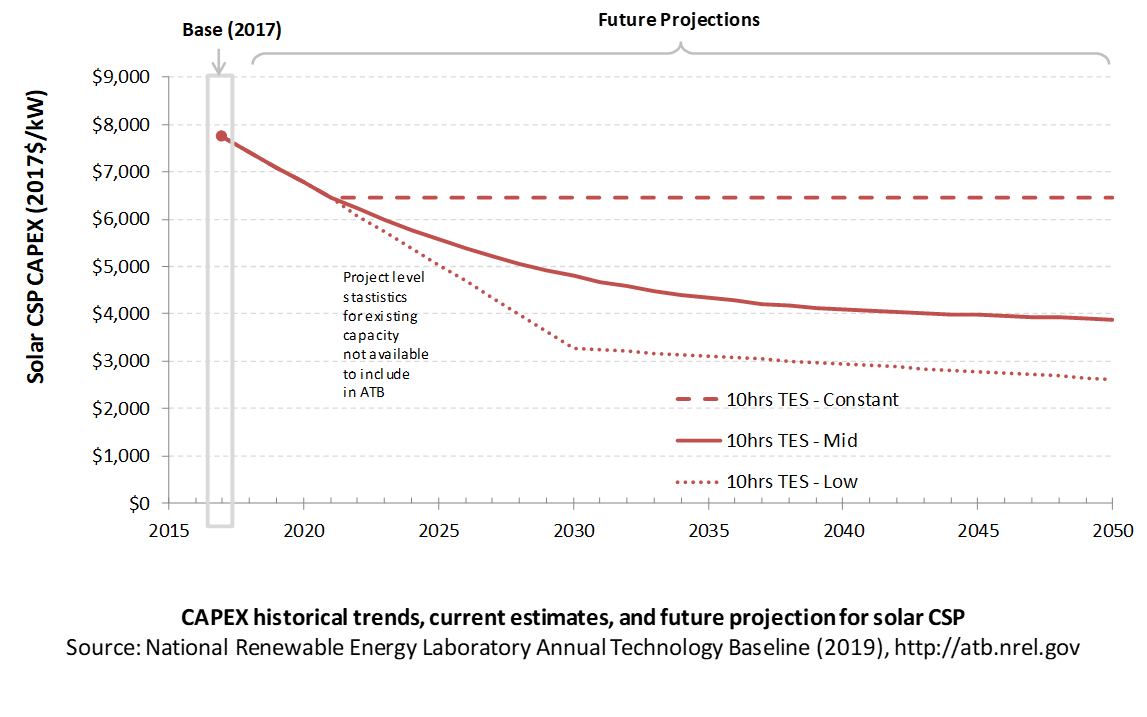Concentrating Solar Power
Capital Expenditures (CAPEX): Historical Trends, Current Estimates, and Future Projections
Capital expenditures (CAPEX) are expenditures required to achieve commercial operation in a given year. These expenditures include the generation plant, the balance of system (e.g., site preparation, installation, and electrical infrastructure), and financial costs (e.g., development costs, and interest during construction) and are detailed in CAPEX Definition. In the ATB, CAPEX reflects typical plants and does not include differences in regional costs associated with labor, materials, taxes, or system requirements. The related Standard Scenarios product uses Regional CAPEX Adjustments. The range of CAPEX demonstrates variation with resource in the contiguous United States.
The following figure shows the Base Year estimate and future year projections for CAPEX costs. Three cost scenarios are represented: Constant, Mid, and Low. The estimate for a given year represents CAPEX of a new plant that reaches commercial operation in that year (i.e., SAM 2018 CSP costs are reflected in the ATB in 2021).

Base Year Estimates
CAPEX is unchanged for resource class because the same plant is assumed to be built in each location. The capacity factor will change with resource.
TES increases plant CAPEX but also increases capacity factor and annual efficiency. TES generally lowers LCOE for power towers.
The CAPEX estimate (with a base year of 2017) is approximately $7,730/kWe in 2017$. It is for a representative power tower with 10 hours of storage and a solar multiple of 2.4. Based on recent assessment of the industry in 2017 and updated CSP systems costs reflected in SAM 2018.11.11 (Craig Turchi et al. 2019), the CAPEX estimate for 2021 is $6,450/kWe in 2017$.
Future Year Projections
Three cost projections are developed for CSP technologies:
- Constant Technology Cost Scenario: no change in CAPEX, O&M, or capacity factor from current estimates (2021 for CSP) to 2050; consistent across all renewable energy technologies in the ATB
- The Mid Technology Cost Scenario is based on recently published literature projections and NREL judgment of U.S. costs for future CAPEX at 2025, 2030, 2040 and 2050 ((IRENA 2016), (Breyer et al. 2017), (Murphy et al. 2019), (Feldman et al. 2016), and (World Bank 2014)). It is anticipated that CSP costs could fall by approximately 25% from the ATB CSP 2021 costs of $6,450/kWe to approximately $4,800/kWe by 2030. From 2030 to 2050, CSP CAPEX is projected to fall to approximately $3,380/kWe.
- The Low Technology Cost Scenariois based on the lower bound of the literature sample, and on the Power to Change report (IRENA 2016).
Relative to today's reported CAPEX for plants either announced or in construction, $6,450/kWe in the ATB in 2021 and $4,800/kWe in 2030 is possible. For example, Noor III (150 MWe molten salt power tower with 7.5 hours of storage and operational in 2018), had an estimated CAPEX of $6,500/kWe in 2017$ (Kistner 2016). The Dubai Electricity and Water Authority (DEWA) 700-MWe CSP portion (600-MWe parabolic trough and 100-MWe molten salt tower, each with 12-15 hours of storage), which is in construction had an estimated bundled CAPEX of $5,500/kWe ( (Shemer 2018), (Craig Turchi et al. 2019)).
A detailed description of the methodology for developing future year projections is found in Projections Methodology.
Technology innovations that could impact future O&M costs are summarized in LCOE Projections.
References
The following references are specific to this page; for all references in this ATB, see References.Breyer, C., Afanasyeva, S., Brakemeier, D., Engelhard, M., Giuliano, S., Puppe, M., … Moser, M. (2017). Assessment of Mid-Term Growth Assumptions and Learning Rates for Comparative Studies of CSP and Hybrid PV-Battery Power Plants. AIP Conference Proceedings, 1850, 160001-1-160001–160009. https://doi.org/10.1063/1.4984535
Feldman, D., Margolis, R., Denholm, P., & Stekli, J. (2016). Exploring the Potential Competitiveness of Utility-Scale Photovoltaics plus Batteries with Concentrating Solar Power, 2015-2030 (No. NREL/TP-6A20-66592). https://doi.org/10.2172/1321487
IRENA. (2016b). The Power to Change: Solar and Wind Cost Reduction Potential to 2025. Retrieved from International Renewable Energy Agency website: https://www.irena.org/DocumentDownloads/Publications/IRENA_Power_to_Change_2016.pdf
Kistner, R. (2016). Update on recent developments in the CSP technology. Retrieved from https://www.giz.de/de/downloads/giz2016_en_CSP%20Update_Abu%20Dhabi.pdf
Murphy, C., Sun, Y., Cole, W., Maclaurin, G., Turchi, C., & Mehos, M. (2019). The Potential Role of Concentrating Solar Power Within the Context of DOE's 2030 Solar Cost Targets (No. NREL/TP-6A20-71912). https://doi.org/10.2172/1491726
Shemer, N. (2018, April 16). CSP capex costs fall by almost half as developers shift towards China and Middle East. Retrieved April 24, 2019, from http://newenergyupdate.com/csp-today/csp-capex-costs-fall-almost-half-developers-shift-towards-china-and-middle-east
Turchi, Craig, Boyd, M., Kesseli, D., Kurup, P., Mehos, M., Neises, T., … Wendelin, T. (2019). CSP Systems Analysis - Final Project Report (No. NREL/TP-5500-72856). Retrieved from National Renewable Energy Laboratory website: https://www.nrel.gov/docs/fy19osti/72856.pdf
World Bank. (2014). Project Appraisal Document on a Proposed Loan in the Amount of EUR234.50 Million and US$80 Million (US$400 Million Equivalent) and a Proposed Loan from the Clean Technology Fund in the Amount of US$119 Million to the Moroccan Agency for Solar Energy with Guarantee from the Kingdom of Morocco for the Noor-Ouarzazate Concentrated Solar Power Plant Project (No. PAD1007). Retrieved from The World Bank website: http://documents.worldbank.org/curated/en/748641468279941398/pdf/PAD10070PAD0P100disclosed0120220140.pdf
